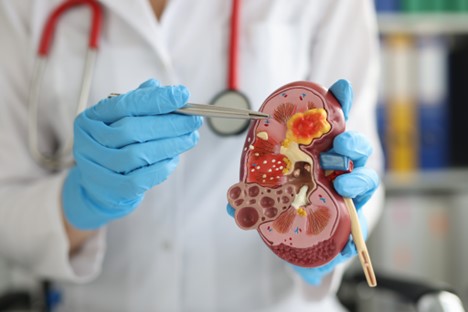Renal cancer can be overwhelming, making awareness crucial. It starts in the kidneys and affects how they function. If the cancer spreads, it can impact other organs. Understanding and catching it early can make a big difference. Knowing the risks helps too. Traits inherited from family, like genetic factors, can raise your chances of getting this cancer. Lifestyle changes can also help. Cutting down on things like smoking and adopting healthier habits can lower risks. Awareness, early detection, and lifestyle adjustments are essential to mitigate the impact of renal cancer.
What is Renal Cancer?
Renal cancer is a type of cancer that affects the kidneys. The kidneys are two bean-shaped organs located on each side of the spine. They help in cleaning the blood and removing waste. Renal cancer starts here and can disrupt those functions. There are a few types of renal cancer:
- Renal cell carcinoma: The most common kind.
- Transitional cell carcinoma: Occurs in the lining of the kidneys.
- Wilms tumor: A rare type affecting children.
Each type behaves differently, requiring varied approaches to treatment. Understanding these basic facts is handy in knowing what renal cancer is about.
Recognizing Renal Cancer Symptoms
Renal cancer symptoms can be tricky because early on, there might be no signs. This makes paying attention to symptoms important. Some common renal cancer symptoms include:
- Blood in urine (hematuria).
- Persistent back pain.
- Unexpected weight loss.
- Constant lethargy.
Watching out for these signs can guide you to seek medical advice promptly. It’s best not to ignore these renal cancer symptoms and take any unusual changes seriously.
The Causes and Risk Factors for Renal Cancer
The causes of renal cancer aren’t completely known, but several factors can increase risk. Genetic factors, like family history, can heighten risk levels. If your family has a history of renal cancer, your chances might be higher.
Lifestyle choices are significant too: – Smoking is a known risk factor. – Obesity: Carrying extra weight can contribute to risk.
Environmental exposures, like certain chemicals, might also play a part in developing renal cancer. Alongside this, having certain medical conditions, such as high blood pressure, can amplify risk. Understanding these factors can lead to informed choices about health.
Understanding Renal Cancer Diagnosis
If you suspect renal cancer, doctors use a few methods to reach a diagnosis. They start with a physical examination to check for any unusual lumps or pain. Imaging tests, such as CT scans and MRIs, are often used. These help in showing the kidney structure and identifying any abnormal growths. In some cases, a biopsy may be necessary. This involves taking a small sample of kidney tissue to check for cancer cells. Understanding the stages of renal cancer through these processes helps guide treatment decisions effectively.
Exploring Renal Cancer Treatment Options
There are various renal cancer treatment options available depending on cancer type and stage. Surgery is often a primary choice: – Partial nephrectomy: Removes part of the kidney containing cancer. – Radical nephrectomy: Removes the entire kidney and possibly nearby tissues.
Non-surgical renal cancer treatment options are also available: – Ablation: Destroys cancer cells using heat or cold. – Targeted therapy: Uses drugs to target specific cancer cells. – Immunotherapy: Boosts the body’s immune system to combat cancer.
Treatments like radiation and chemotherapy might be used, but less commonly. Your healthcare provider will guide you through selecting the most suitable renal cancer treatment options.
Living with and Managing Renal Cancer
Living with renal cancer demands strength and support. Coping strategies like joining support groups can be beneficial. Sharing experiences with others who understand your journey is valuable. Regular follow-ups with your doctor are crucial after treatment. This ensures that any recurrence is caught early. Monitoring kidney health also becomes important. Maintaining a healthy lifestyle can help manage the condition and support overall well-being.
Preventing Renal Cancer: Tips and Strategies
Prevention plays a key role in managing renal cancer risk. Consider these strategies: – Embrace a balanced diet and regular exercise. – Quit smoking to reduce risk. – Schedule regular health check-ups to catch early signs.
Focusing on kidney health through these preventive measures aids in overall well-being.
Conclusion
Understanding renal cancer is vital due to its impact on health. Early detection, knowing renal cancer symptoms, and exploring available renal cancer treatment options are key elements in managing this disease. Don’t hesitate to seek professional medical advice when needed. Being proactive about health management can greatly improve outcomes. Remember, early action makes a significant difference in tackling renal cancer effectively.
For expert care and treatment, visit Qazi Ashraf. Our experienced team is dedicated to providing the best solutions for managing renal cancer and supporting your overall health.
